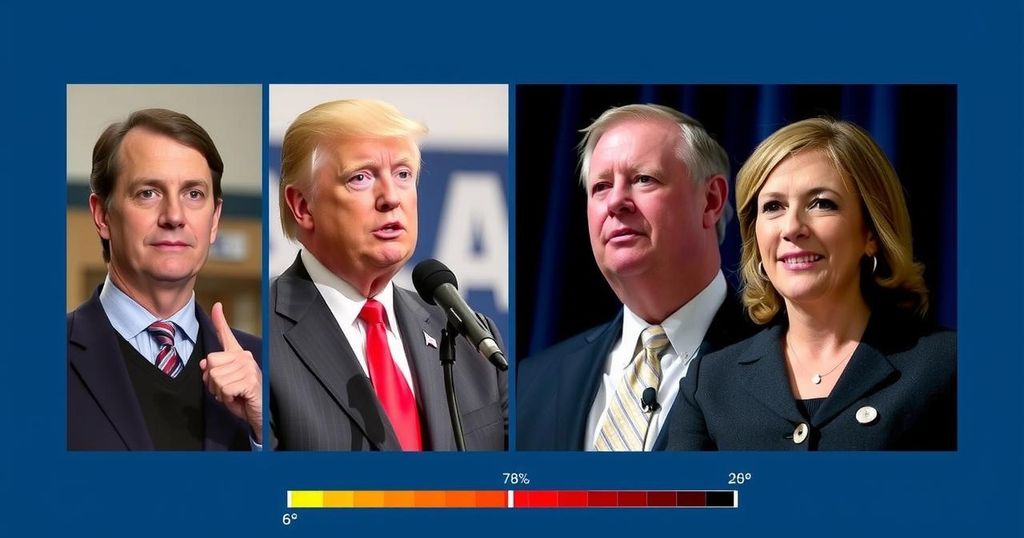World news
AFRICA, ASSOCIATED PRESS, CIVIL RIGHTS, CONGRESS, DEMOCRATS, ELECTION, JOHN MCGUIRE, KAMAL, LOUDON, LOUDON COUNTY, NORTH AMERICA, PRESIDENTIAL CANDIDATES, PRESIDENTIAL ELECTION 2024, RAM VENKATACHALAM, REPRODUCTIVE RIGHTS, REPUBLICAN, RICHMOND, SENATE, SOUTH AFRICA, SUHAS SUBRAMANYAM, TU, U. S. SENATE, UNITED STATES, VIRGINIA
Elena Martinez
0 Comments
Virginia’s Special Elections as Indicators of Future Political Battles
Democrats retained their majorities in Virginia’s legislature by winning two of three special elections, indicating voter sentiment following recent Republican gains. Key races were held in Loudon County, a notable battleground over transgender issues. The outcomes forecast the political landscape for upcoming gubernatorial elections in Virginia and New Jersey, with national attention focused on these early indicators of political sentiment.
Recent special elections in Virginia indicate that Democrats have managed to sustain their slim majorities in the state legislature, winning two out of three key contests. These elections represent an important early measure of voter sentiment following the recent electoral gains by Republicans, including President-elect Donald Trump’s significant victory in November. The outcomes are viewed as preliminary indicators for upcoming gubernatorial races in Virginia and New Jersey, as well as the critical midterm elections in 2026.
In detail, the special elections, particularly in Loudon County—a region engaged in heated debates surrounding transgender rights—saw Democratic candidates secure wins. Kannan Srinivasan won a state Senate seat, previously held by Suhas Subramanyam, while JJ Singh succeeded Srinivasan in the House of Delegates. Conversely, Republicans managed to win a Senate seat west of Richmond, where Luther Cifers defeated Democrat Jack Trammell.
As the Democrats maintain a 21-19 majority in the Virginia Senate and a 51-49 lead in the House of Delegates, this could complicate the agenda for Republican Governor Glenn Youngkin, who is concluding his term. Youngkin’s rise to prominence came after he successfully ousted former Democratic Governor Terry McAuliffe in a tight 2021 race. Notably, Virginia’s political landscape is unique, with laws preventing consecutive gubernatorial terms, thus preventing Youngkin from seeking re-election next year.
Given that both Virginia and New Jersey will hold gubernatorial elections following the presidential election, the upcoming contests will likely attract extensive national scrutiny. Virginia, in particular, is often regarded as a bellwether for national political dynamics, providing insights into voters’ attitudes toward the current administration.
The recent special elections in Virginia serve as crucial indicators of the state’s political climate and voter sentiment ahead of significant elections in 2025 and 2026. These contests reflect the aftermath of the 2022 electoral cycle, characterized by Republican gains at both federal and state levels. Additionally, Virginia’s political nuances, including its unique restrictions on gubernatorial terms, render it a focal point for political analysts, particularly during election cycles immediately following presidential elections. As demographics and political issues evolve in regions such as Loudon County, understanding these trends becomes essential for anticipating future electoral outcomes.
The results from Virginia’s special elections exemplify the ongoing political struggles within the state and highlight the Democrats’ ability to hold onto significant legislative control amidst Republican resurgence. As both gubernatorial and congressional races approach in the next few years, these election outcomes will not only affect Virginia’s political landscape but potentially serve as a microcosm of national electoral trends. Monitoring these developments will be essential for understanding the broader implications on party dynamics and voter behavior moving forward.
Original Source: www.foxnews.com




Post Comment